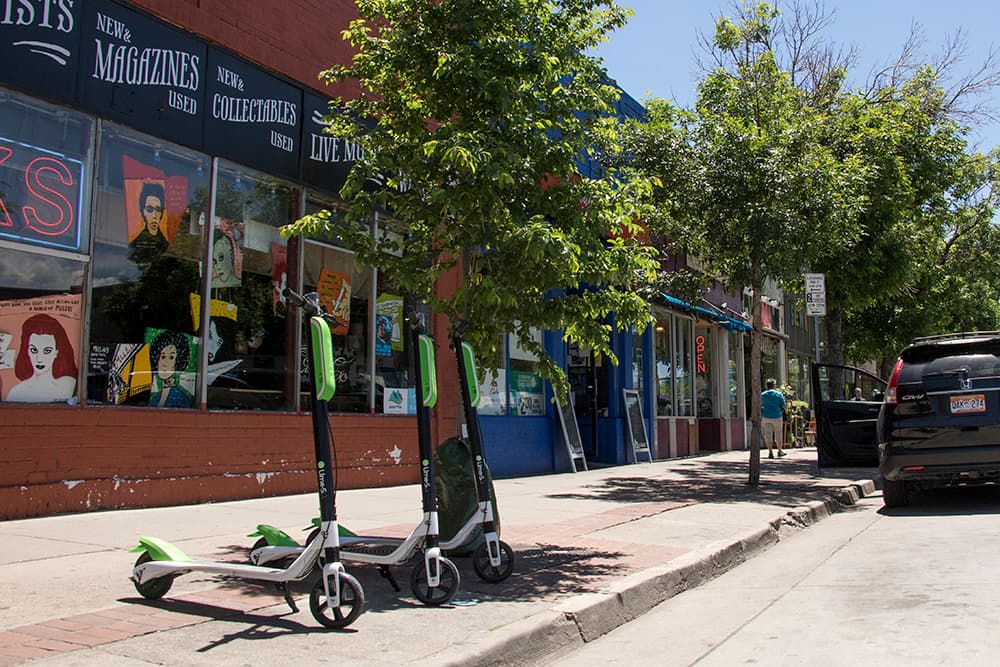UPDATE, Friday, June 29: Denver has officially released the details of the pilot program that we reported earlier this week. A new release from Denver Public Works emphasizes that Denver wants the dockless vehicles to increase the number of people who have access to public transportation.
To accomplish that, the companies are expected to stock and continuously "rebalance" vehicles back to transit stops, rather than leaving them around on blocks. The goal is that scooters and bikes are readily available at transit stops — though that might mean that they are harder to find elsewhere.
The companies are asked to find ways to encourage their users to return the vehicles to transit stops through "gamification, other incentives, or geofencing tactics." That last idea would mean that the software actually limits where the vehicles can be deactivated.
No riding is allowed on streets, bike lanes, parks, trails or the 16th Street Mall.
An earlier document released by Denverite was more restrictive, saying that the vehicles would be "required to start and end ALL TRIPS at transit stops."
Here's how Nancy Kuhn, spokesperson for public works, described the change: "I think it is a slight shift, adding a bit of flexibility for dockless scooter users, recognizing there may be occasional challenges finding a bus or transit stop and then, instead, asking operators to be responsible for rebalancing the vehicles to the transit stations for added reliability and predictability for users," she wrote in an email.
EARLIER: A proposed new pilot program in Denver would allow companies like Lime and Bird to operate legally, but it would strictly limit where the vehicles can be stored and used.
Here's what we know about the proposed pilot program, based on a presentation provided to Denverite. City officials confirmed the details, but said that this was only a "starting point." A final proposal is expected Friday.
Dockless companies would have to get permits. If they don't have permits, they wouldn't be allowed to leave their vehicles in public spaces. Different permits will be required for different vehicles, such as bikes/e-bikes and scooters.
There could only be a limited number of vehicles. The pilot would only allow five bike operators and five scooter operators. The bike operators could have 400 vehicles each, or 500 if they commit to operating in "opportunity areas." The scooter operators could have 250 vehicles, with an option to go to 350. Those numbers could be increased after six months.
They would only be allowed in a limited area. The city would designate "target areas" near transit stations, where the vehicles could only be placed in "painted parking zones." Outside of those areas, users will still be "required to begin and end all trips at transit stops."
Currently, the scooters are only allowed on the sidewalks, not in bike lanes, because they're classified as "toy vehicles." They also can't be used in Denver's parks. The companies may also have to get licenses with RTD to store their equipment on RTD property.
The companies would have to keep close track of their vehicles. They would have to "rebalance vehicles back to transit stations continuously," with all vehicles beginning and ending the day at transit stops. The city suggested that companies could use their tech to encourage good behavior from users. For example, "geofencing" might detect whether a vehicle is parked in the right area. Bird already is asking users to take photos of their parking jobs, according to a representative.
It would cost the companies. The city is proposing a $1,500 fee to apply, $15,000 for the permit, and a $20 or $30 cost per vehicle. (The cost per vehicle could change.) They also could have to get written approvals from business districts, such as the RiNo Art District. And they would be asked to outline their "approach to equity," including potential discount programs.
Users will have to obey parking rules. They would have to leave five feet of clear space for pedestrians on sidewalks; be parked against buildings or at least 1.5 feet from the curb; and "preserve pedestrian sight triangles."
What's next?
Applications will be accepted beginning on Friday, and scooters could return within a matter of weeks after that.
"We intend to open up the permit process and provide dockless companies with a way to apply for a permit starting this Friday, June 29," wrote public works spokesperson Nancy Kuhn in an email to Denverite. "We’ll need some turnaround time to review permit applications, but will be working to get back to the companies that apply within a short time frame."














